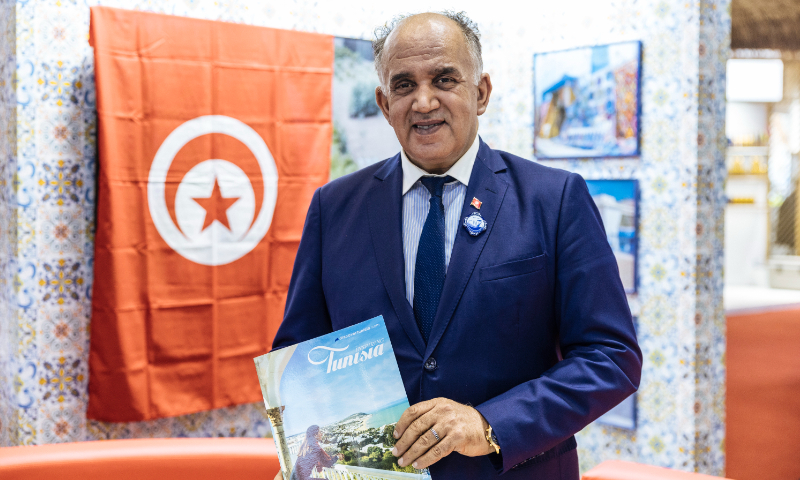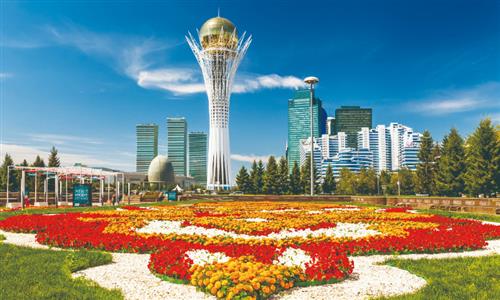BRI paves the way for expanded China-Tunisia cooperation in infrastructure, agriculture, trade, and more: envoy
Consolidating partnership

A view of Sidi Bou Said, a seaside town in northern Tunisia File photo: VCG
Tunisia embraces free trade and open market and oppose trade protectionism, and it values China's open economy for sharing global opportunities, Tunisian Ambassador to China Adel Elarbi told the Global Times in a recent exclusive interview.

Tunisian Ambassador to China Adel Elarbi Photo: Li Hao/GT
Against the backdrop of the complex geopolitical situation, such as rising protectionism, China continues to keep its door wide open, and the cooperation with developing countries, including Tunisia, has yielded fruitful results.For example, economic and trade relations between China and Tunisia have grown significantly, with China becoming one of Tunisia's major trading partners. In 2023, their bilateral trade reached $2.27 billion, a 7.1 percent year-on-year increase, according to data from the Chinese Embassy in Tunisia.
Growing optimism
This year marks the 60th anniversary of the establishment of diplomatic relations between China and Tunisia, which have made significant achievements. The ambassador said he is optimistic for stronger bilateral ties under the Belt and Road Initiative (BRI) framework, which will open up new fronts for cooperation in infrastructure, agriculture, trade, investment and more fields.
Tunisia advocates for free trade and open markets while opposing trade protectionism, said Elarbi.
The economy of China is open, guided by the government's policies of opening-up and sharing the country's great market opportunities with other economies, the ambassador said.
Moreover, Tunisia is strategically located in the northern tip of Africa, providing crucial access to many African and European countries, Elarbi said, noting that Tunisia aims to serve as a strategic hub for exporting Chinese products across the region.
"We hope that Tunisia can be a stepping stone for Chinese products to get to other markets in the region and beyond," Elarbi said.
The two countries are economically complementary. Chinese products are broadly popular in northern Africa region, including in Tunisia. Meanwhile, Tunisian enterprises are also tapping into China's vast market, catering to Chinese consumers' demand for high-quality, healthy products, Elarbi said, adding that both countries will benefit greatly, provided they continue to work together and expand cooperation.
In addition to trade, Tunisia values China's competitive edge in infrastructure development. "We see that China has built very strong infrastructure projects and we look forward to getting more Chinese investors in Tunisia… our country stands to benefit from Chinese expertise," he said.
Chinese enterprises have made significant contributions to Tunisia in infrastructure development, green growth, environmental protection, and talent training, according to the Chinese Embassy in Tunisia.
For example, Sichuan Road & Bridge Co is building a new bridge across the Bizerte Canal in the Tunisian city of Bizerte. The project is expected to significantly ease traffic congestion and boost local trade, the Xinhua News Agency reported.
Infrastructure build-up
A notable example is the 100-megawatt solar power plant in Kairouan, Tunisia, which began construction in May by a Chinese company.
The project is one of the largest solar power projects under development in Tunisia, Xinhua reported. The project is expected to train a large number of local professionals in the fields of new energy construction and operation, which will help introduce China's advanced new energy technology to Tunisia, the Xinhua report said.
As a BRI partner country, Tunisia is eager to leverage the multilateral mechanisms to achieve ever greater mutual benefits with China, the ambassador said.
"I hope that our shared values of cooperation, solidarity, and mutual benefit can extend and be translated into tangible results that benefit both nations," the ambassador said.

Visitors visit the booth of Tunisia at the 2024 China Outbound Travel & Tourism Market in Beijing, on October 16, 2024. Photo: VCG
There are significant growth areas for BRI cooperation, including energy transformation, the green economy, and the service sector, as China focuses on high-quality BRI cooperation with the partners, Song Wei, a professor from the School of International Relations and Diplomacy at Beijing Foreign Studies University, told the Global Times on Tuesday.
Song emphasized the potential for solidifying the two countries' economic ties. "Both China and Tunisia are strong advocates of free trade, which means that efforts can be made to further reduce trade barriers... This includes increasing direct air flights and implementing measures to facilitate trade and investment between Chinese and Tunisian companies," Song said.
With the cooperation under the BRI framework gaining impetus worldwide, it has also caused smears from some Western media outlets, which claim China is using the initiative to influence other countries.
Responding to such claims, Elarbi said that "it's now an open world. We share values and we cooperate with each other, and naturally, countries are more or less influenced by each other… but the BRI is such a good platform of cooperation that we have found our objectives, and our aspirations to be realized."



